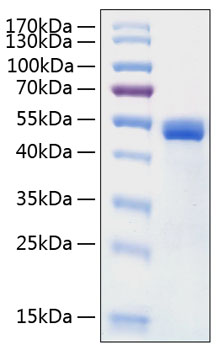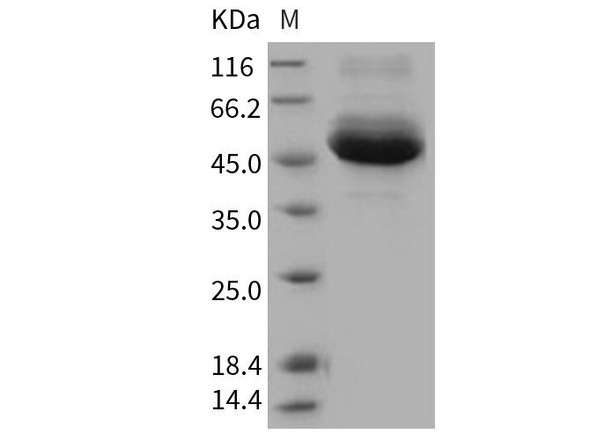Description
Recombinant Human Cathepsin D Protein
The Recombinant Human Cathepsin D Protein is a biologically active recombinant protein that plays a significant role in various cellular processes and signaling pathways in human biology. This protein is widely employed in immunological research, cell biology studies, protein-protein interaction analyses, and therapeutic development, providing researchers with a reliable tool for investigating Cathepsin D function and its implications in health and disease.
This product (SKU: RPCB0323) is produced using HEK293 cells and features a C-His tag for convenient detection and purification. The protein exhibits a calculated molecular weight of 43.44 kDa with an observed molecular weight of 48-52 kDa under denaturing conditions, achieving ≥ 95 % as determined by SDS-PAGE.. Functional bioactivity has been validated through rigorous quality control assays, confirming its suitability for demanding research applications.
Key Features
| High Purity by Affinity Chromatography | |
| Mammalian & Bacterial Expression Systems | |
| High lot-to-lot consistency via strict QC |
| Product Name: | Recombinant Human Cathepsin D Protein |
| SKU: | RPCB0323 |
| Size: | 10 μg , 50 μg , 100 μg |
| Reactivity: | Human |
| Synonyms: | CLN10, CPSD, HEL-S-130P, Cathepsin D, CTSD |
| Tag: | C-His |
| Expression Host: | HEK293 cells |
| Calculated MW: | 43.44 kDa |
| Observed MW: | 48-52 kDa |
| Gene ID: | 1509 |
| Protein Description: | High quality, high purity and low endotoxin recombinant Recombinant Human Cathepsin D Protein (RPCB0323), tested reactivity in HEK293 cells and has been validated in SDS-PAGE.100% guaranteed. |
| Endotoxin: | < 0.1 EU/μg of the protein by LAL method. |
| Purity: | ≥ 95 % as determined by SDS-PAGE. |
| Formulation: | Lyophilized from a 0.22 μm filtered solution of PBS, pH 7.4.Contact us for customized product form or formulation. |
| Bio-Activity: | Measured by its ability to cleave the fluorogenic peptide substrate, Mca-PLGL-Dpa-AR-NH2. The specific activity is >747 pmol/min/μg. |
| Reconstitution: | Centrifuge the vial before opening. Reconstitute to a concentration of 0.1-0.5 mg/mL in sterile distilled water. Avoid vortex or vigorously pipetting the protein. For long term storage, it is recommended to add a carrier protein or stablizer (e.g. 0.1% BSA, 5% HSA, 10% FBS or 5% Trehalose), and aliquot the reconstituted protein solution to minimize free-thaw cycles. |
| Storage: | Store at -20℃.Store the lyophilized protein at -20℃ to -80 ℃ up to 1 year from the date of receipt. After reconstitution, the protein solution is stable at -20℃ for 3 months, at 2-8℃ for up to 1 week. |
Cathepsin D (CTSD), a well known lysosomal aspartyl protease and belongs to the peptidase C1 family. It is expressed in most cells and overexpressed in breast cancer cells. It is a major enzyme in protein degradation in lysosomes, and also involved in the presentation of antigenic peptides. cathepsin D is essential for proteolysis of proteins regulating cell growth and tissue homeostasis. CTSD secreted from human prostate carcinoma cells are responsible for the generation of angiostatin, a potent endogenous inhibitor of angiogenesis, suggesting its contribution to the prevention of tumor growth and angiogenesis-dependent growth of metastases.







